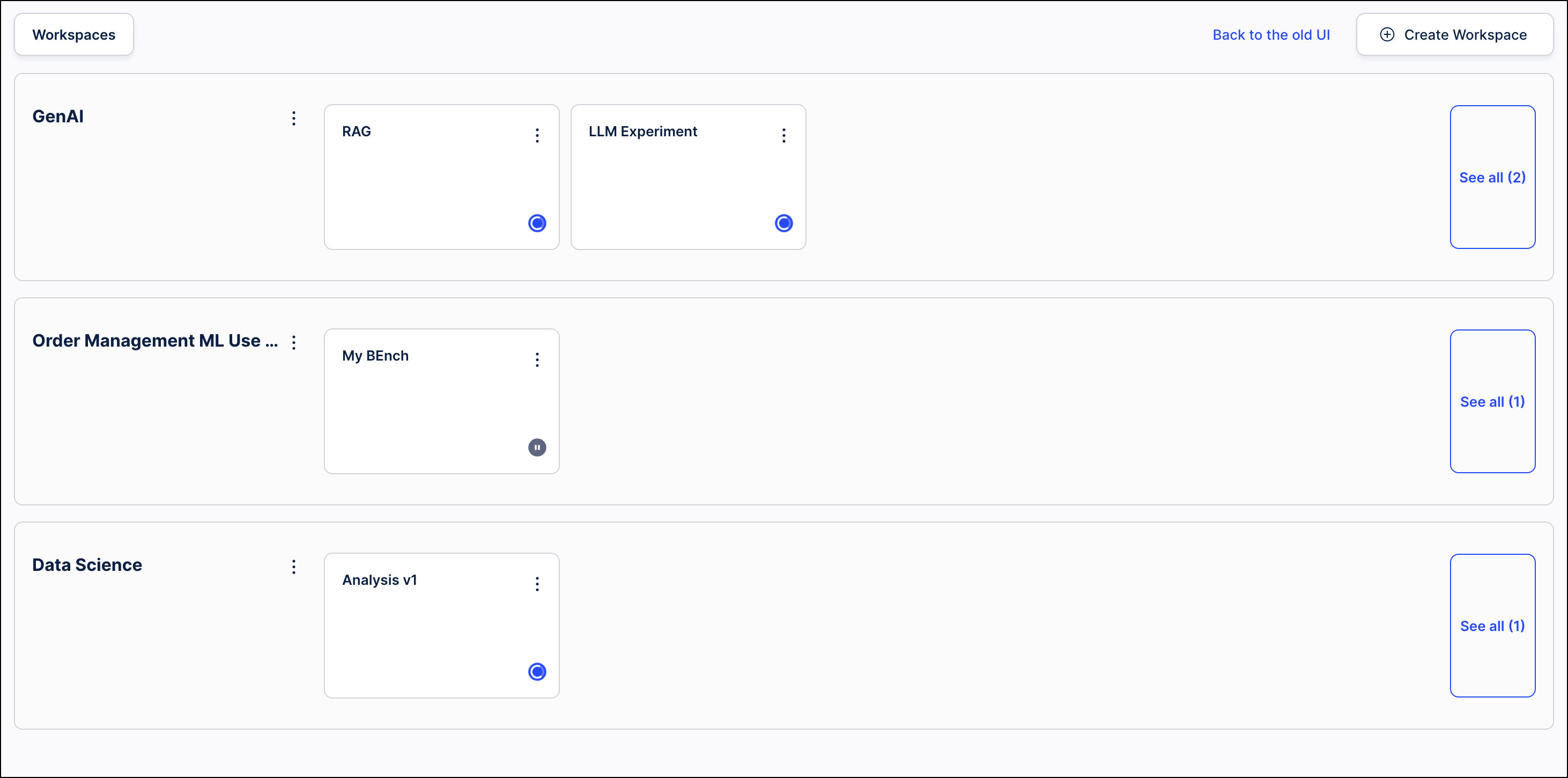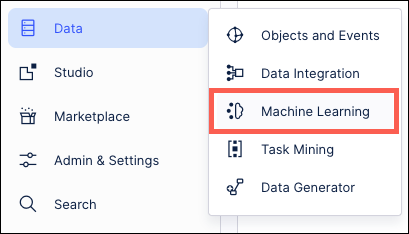Machine Learning
The Celonis Platform offers integrated and embedded machine learning capabilities, giving you access to a fully hosted and managed machine learning workbench (MLWB). This workbench is an integrated Python development environment based on Jupyter Notebook. These integrated tools require no installation, no maintenance, and no server requests.
 |
You can access the machine learning features on the Celonis Platform by clicking Data > Machine Learning:

Machine learning workbench activity types
When using the machine learning workbench, you can choose from:
Notebooks and console
Python3 (lpykernel)
Julia 1.5.3
Python 3.8 (XPython raw)
Python 3.8 (XPython)
R
Other
Terminal
Text file
Markdown file
Julia file
Python file
R file
Shared Node (free) vs. Dedicated Node (paid) versions
There are two types of access to machine learning on the Celonis Platform:
Shared Node - This is the free version of machine learning workbench that is included with your Celonis license and offers less computing power and storage capacity than the paid subscription versions. The Shared Node is slower than the Dedicate Node and cannot be used to map all use cases since the data may be too large to be processed.
Dedicated Node - The paid version of machine learning workbench that guarantees your resources are available at all times. The Dedicated Node can be used to process larger use cases that cannot be processed by the shared version. There are multiple plans to choose from when upgrading to the Dedicated Node.
The table below offers a high level comparison of the resources available in the different plans. The options columns indicate the values in which each resource can be allocated to a workbook in the Dedicated Node plans. Resources in the Shared Node plan are static and cannot be allocated.
Note
The Shared Node plan includes a maximum of 3 workbenches. In the Dedicated Node plans, you can create any number of workbenches in multiples of 2.
Plan name | Total CPU | CPU options | Memory (GB) | Memory options (GB) | Storage (GB) | Storage options (GB) |
|---|---|---|---|---|---|---|
Shared Node | ||||||
Included plan | 1 per workbench | N/A | 4 per workbench | N/A | 5 per workbench | N/A |
Dedicated Nodes | ||||||
X-small | 2 | 0.25, 0.5, 1, 2 | 16 | 1, 2, 4, 8, 16 | 50 | 5, 10 |
Small | 4 | 0.25, 0.5, 1, 2, 4 | 32 | 1, 2, 4, 8, 16, 32 | 50 | 5, 10 |
Medium | 8 | 0.25, 0.5, 1, 2, 4, 8 | 64 | 1, 2, 4, 8, 16, 32, 48, 64 | 100 | 5, 10, 25 |
Large | 16 | 0.25, 0.5, 1, 2, 4, 8, 16 | 128 | 1, 2, 4, 8, 16, 32, 48, 64, 96, 128 | 200 | 5, 10, 25, 50 |
2x-large | 32 | 0.25, 0.5, 1, 2, 4, 8, 16 | 256 | 1, 2, 4, 8, 16, 32, 48, 64, 96, 128 | 400 | 5, 10, 25, 50, 100 |
3x-large | 64 | 0.25, 0.5, 1, 2, 4, 8, 16 | 512 | 1, 2, 4, 8, 16, 32, 48, 64, 96, 128 | 800 | 5, 10, 25, 50, 100 |
4x-large | 128 | 0.25, 0.5, 1, 2, 4, 8, 16 | 1024 | 1, 2, 4, 8, 16, 32, 48, 64, 96, 128 | 1600 | 5, 10, 25, 50, 100 |
To upgrade to a Dedicated Node plan, contact your Celonis sales representative.
Celonis Python packages
Celonis also offers a pre-installed Python package called PyCelonis, enabling you to use your Celonis Platform data when creating machine learning notebooks.
PyCelonis package
PyCelonis is a Python-based API wrapper for the Celonis Platform. With this package you can interact with Celonis objects as native objects, such as copying an analysis, pulling and pushing data, or reloading a data model.
For more information about PyCelonis, see PyCelonis documentation.
For tutorials on how to use PyCelonis, see PyCelonis tutorials.
PyCelonis example repository
The PyCelonis example repository contains demo notebooks covering popular PyCelonis examples and use cases. The repository contains notebooks for both PyCelonis 1.X and 2.X and shows what you can achieve using PyCelonis. These examples are grouped by both their PyCelonis version and by their specific use cases.